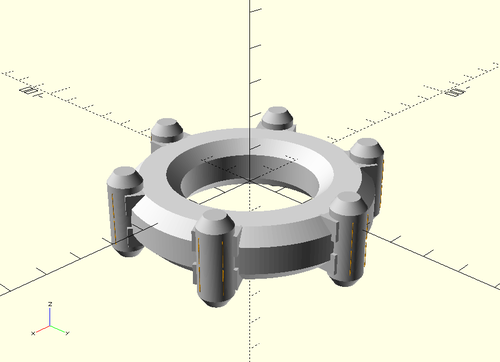Difference between revisions of "Warp collar"
(Created) |
|||
| Line 4: | Line 4: | ||
In the early days of interstellar exploration (the ''[[Alpha Centauri]]'' series), the warp apparatus -- power system and warp modules or pods -- were too massive to build into a spacecraft capable of landing on and taking off again from an Earthlike planet. The compromise was the warp collar, a unit comprising both the fusion reactor power source (originally based on a Chinese tokamak design, hence the "donut") and the pods for the warp modules. This interstellar propulsion module surrounds the landing craft (a chemical-propellant, SSTO-based design) to generate the field for warp travel, and could be undocked for the lander to make planetfall. | In the early days of interstellar exploration (the ''[[Alpha Centauri]]'' series), the warp apparatus -- power system and warp modules or pods -- were too massive to build into a spacecraft capable of landing on and taking off again from an Earthlike planet. The compromise was the warp collar, a unit comprising both the fusion reactor power source (originally based on a Chinese tokamak design, hence the "donut") and the pods for the warp modules. This interstellar propulsion module surrounds the landing craft (a chemical-propellant, SSTO-based design) to generate the field for warp travel, and could be undocked for the lander to make planetfall. | ||
| − | Like any unmanned spacecraft, the warp collar has its own systems for limited | + | [[File:warp-collar.png|500px|right|"IPM with fusion toroid and six warp pods"]] |
| + | The image to the right is a representation of a warp collar like those used by the landers ''Chandrasekhar'', ''Krechet'', and ''[[USS Poul Anderson|Poul Anderson]]'' in ''[[Alpha Centauri: First Landing]]''. | ||
| + | |||
| + | Like any unmanned spacecraft, the warp collar has its own systems for limited manoeuvring and stationkeeping. It can be controlled either from the lander or any other (authorized) ship or control center to which control has been transferred. Since the unit never enters atmosphere, there is no particular need for streamlining or aerodynamic shape, and the final integration of the module's components is performed in space (hence the yellow handrails on the warp pods, although in practice there would be more of these). | ||
Revision as of 21:09, 31 December 2016
Interstellar Propulsion Module
Also known as the "warp collar" and "warp donut".
In the early days of interstellar exploration (the Alpha Centauri series), the warp apparatus -- power system and warp modules or pods -- were too massive to build into a spacecraft capable of landing on and taking off again from an Earthlike planet. The compromise was the warp collar, a unit comprising both the fusion reactor power source (originally based on a Chinese tokamak design, hence the "donut") and the pods for the warp modules. This interstellar propulsion module surrounds the landing craft (a chemical-propellant, SSTO-based design) to generate the field for warp travel, and could be undocked for the lander to make planetfall.
The image to the right is a representation of a warp collar like those used by the landers Chandrasekhar, Krechet, and Poul Anderson in Alpha Centauri: First Landing.
Like any unmanned spacecraft, the warp collar has its own systems for limited manoeuvring and stationkeeping. It can be controlled either from the lander or any other (authorized) ship or control center to which control has been transferred. Since the unit never enters atmosphere, there is no particular need for streamlining or aerodynamic shape, and the final integration of the module's components is performed in space (hence the yellow handrails on the warp pods, although in practice there would be more of these).
